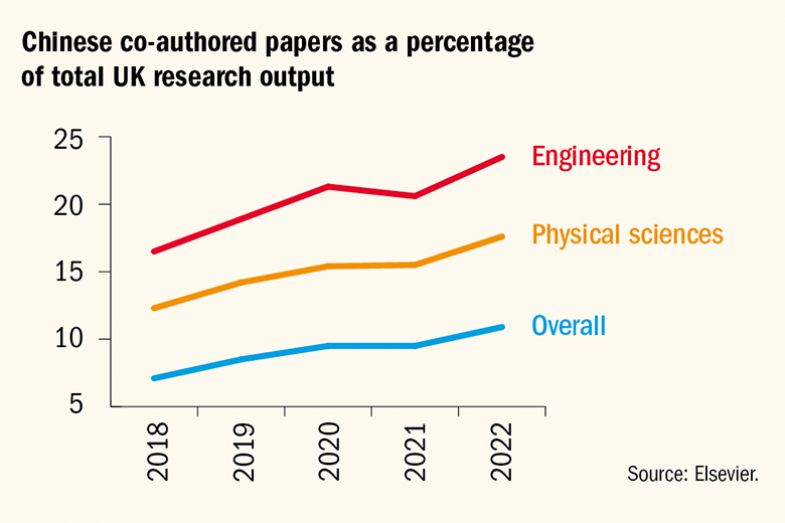Browse the full results of the World University Rankings 2024
UK researchers rely on Chinese collaborators for nearly a quarter of all outputs in some key fields, Times Higher Education World University Rankings data shows.
Analysis of Elsevier bibliometrics shows that UK- and China-based academics co-authored 24,028 research papers in 2022, representing 10.9 per cent of the UK’s total publications. This was up from 7.1 per cent in 2018.
However, in certain key disciplines the reliance on China was much greater. In engineering, Chinese collaborations accounted for 23.5 per cent of all UK outputs in 2022, up from 16.5 per cent five years previously.
Across the physical sciences, such partnerships made up 17.6 per cent of UK output last year.
World University Rankings 2024: results announced

The data comes after the publication of a report earlier this month by the Policy Institute at King’s College London, which warned that many leading UK universities remain over-reliant on China, despite the risk to such ties from geopolitical tensions.
Citing Clarivate data, the King’s report identified a range of more narrow subject areas where Chinese collaboration is even more prominent: for example, 45.5 per cent of UK research papers on automation control systems published between 2017 and 2021 in 21,000 leading journals had a China-based co-author.
Telecommunications, electrical engineering, artificial intelligence and information systems all had Chinese collaboration rates of between 30 and 40 per cent.
Participate in THE's Impact Rankings 2024 - the world's leading impact and sustainability rankings
The King’s report, led by former universities minister Lord Johnson of Marylebone, said that UK research institutions would face significant damage if they disengaged from China, and that “no viable alternative partner exists to fill the gap”.
It said that ministers and intelligence agencies needed to produce “clearer guidance” for “universities to maintain scientific collaboration and intellectual exchange with China for as long as the geopolitical context permits and it remains in the national interest”.
Commenting on the latest data, Lord Johnson noted that, as the world’s largest spender on research and development, China was a vital partner in scientific research.
“With the US and China locked in an intensifying contest for technological leadership that is already drawing in the UK and many other countries, the chances that the global scientific endeavour will be disrupted by geopolitics have risen sharply over the last two years,” Lord Johnson said.
“Assessing and mitigating the impact of such disruption is a critical responsibility of university leaders and policymakers as they contemplate a global knowledge economy that could begin to deglobalise at pace.”
James Keeley, honorary associate of the Institute of Development Studies at the University of Sussex, cautioned that many UK-China research collaborations being published now could still date back to before the Covid-19 pandemic, so there may be some fall-off in partnerships over time.
“Nevertheless, the continued concentration of Chinese doctoral students in high-tariff institutions, as well as Chinese nationals working in research in these institutions with links to Chinese research institutions, suggests that high levels of UK-Chinese co-authorship are likely to continue,” he said.
“This highlights the need for institutions to look at how to diversify their research partnerships in particular areas, and for sector-wide institutions to adopt a strategic and long-term approach, including undertaking further analysis of where de-risking is necessary and supporting actions that can be taken.”
In the latest THE ranking, China has 13 universities in the top 200 – up from seven in 2020 – with each of them improving their ranking significantly.
Register to continue
Why register?
- Registration is free and only takes a moment
- Once registered, you can read 3 articles a month
- Sign up for our newsletter
Subscribe
Or subscribe for unlimited access to:
- Unlimited access to news, views, insights & reviews
- Digital editions
- Digital access to THE’s university and college rankings analysis
Already registered or a current subscriber? Login








